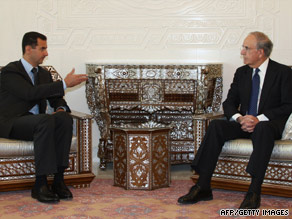
A week of U.S. diplomatic maneuvering in the Middle East began Sunday with special envoy George Mitchell meeting with Syrian President Bashar al-Assad before heading to Israel.
Top U.S. defense officials, including Defense Secretary Robert Gates, also will be in Israel this week to meet with Prime Minister Benjamin Netanyahu and security counterparts. Netanyahu, who has been at odds with President Obama’s government on some key issues, welcomed the U.S. visitors. “These important visits are part of a thick and strong network of ties between Israel and the United States, a network that has been in the past and continues to exist these days as well,” Netanyahu said Sunday at the start of his weekly Cabinet meeting. He added, “Naturally, even within the fabric of friendly relations between allies, there isn’t full agreement on all points, and on different issues we are trying to reach that understanding so that we can together advance our common goals: peace, security and prosperity for the whole of the Middle East.” The Syrian Arab News Agency, or SANA, quoted Mitchell as saying his meeting with Assad was “important and positive.” He told journalists the talks involved prospects for progress in reaching a comprehensive peace agreement in the region and bolstering U.S. ties with Syria, according to SANA. Mitchell also said Obama believes a comprehensive peace agreement that offers security, stability and prosperity to all countries in the Middle East is the only way to end hostilities between Arabs and Israelis, SANA reported.
Don’t Miss
Commentary: Middle East is changed forever
Obama to send U.S. ambassador back to Syria
Revolutionary Guard leader warns Israel
Last month, the United States signaled warming relations with Syria by announcing it intended to send a U.S. ambassador to Damascus for the first time in four years. The United States withdrew its ambassador from Syria in 2005 in protest at the assassination of former Lebanese Prime Minister Rafik Hariri. Washington accused Syria of being behind the killing of the popular statesman in a massive bombing that also left 22 others dead. Syria denies the accusation. An ongoing United Nations investigation has found indications of Syrian involvement. A charge d’affaires has been the highest-level American diplomat in Damascus since 2005. Mitchell, a former U.S. senator who is Obama’s special Middle East envoy, visited Syria two weeks before the June announcement about returning an ambassador to the country. Also Sunday, U.S. Secretary of State Hillary Clinton cited Israel’s sovereign right to defend itself from an “existential threat” by Iran, affirming a similar comment in recent weeks by Vice President Joe Biden. “They’re not going to listen to other nations if they believe they are acting in the furtherance of their survival,” Clinton said of Israel on the NBC program “Meet the Press.” On a trip to Asia last week, Clinton raised concerns about a softening of U.S. opposition to Iran developing a nuclear weapon when she commented that such a result would fail to strengthen Iran’s regional influence. Clinton said Sunday that U.S. policy remains firmly opposed to a nuclear-armed Iran. “We believe as a matter of policy it is unacceptable for Iran to have nuclear weapons,” she said.